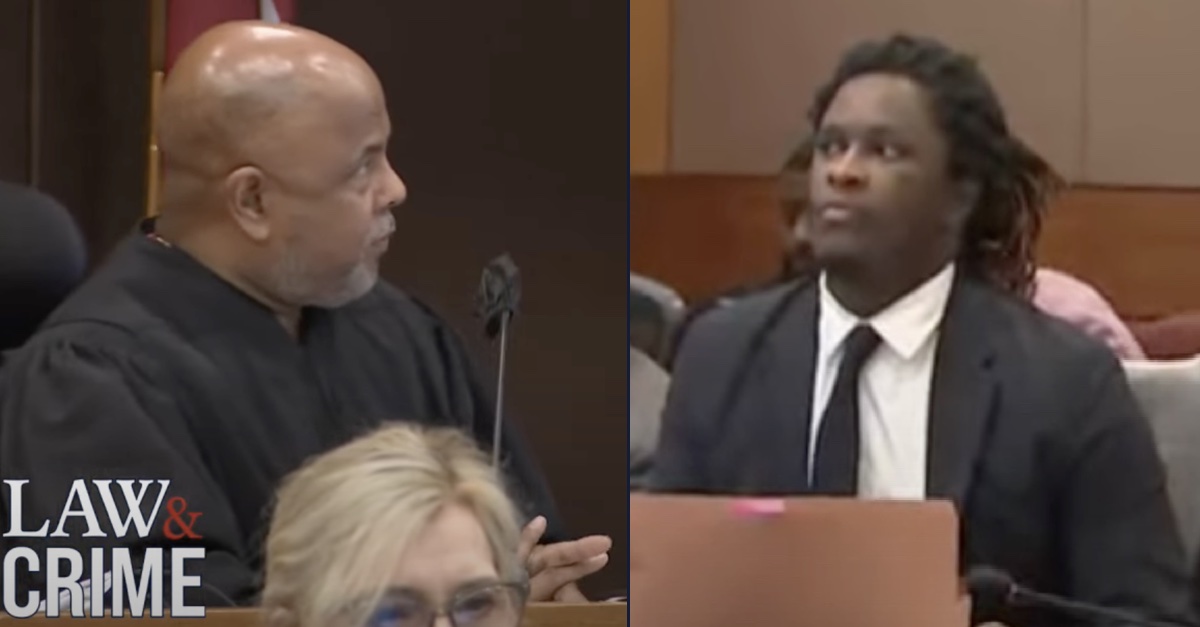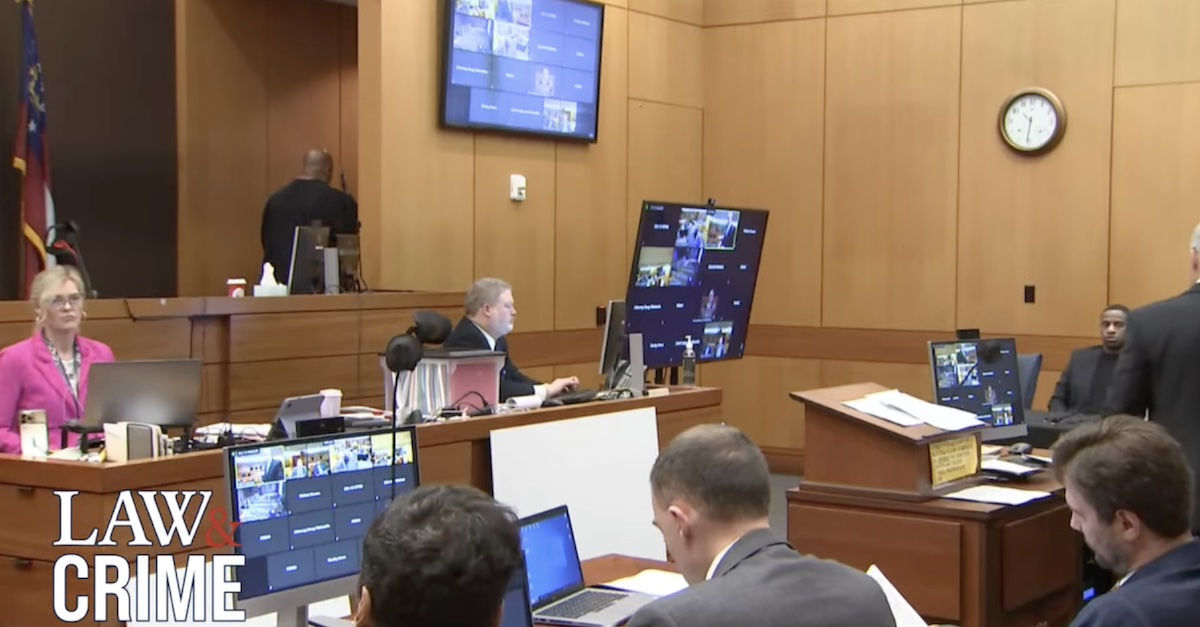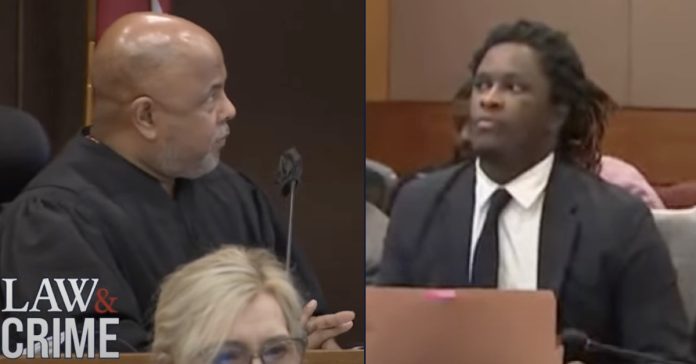
Judge Ural Glanville issues his ruling on rap lyrics (left), Jeffery Williams, known professionally as Young Thug (right) in court on April 2, 2024 (Law&Crime Network)
With the jury off, defense attorneys and prosecutors in the YSL RICO trial had an opportunity to argue over key motions on Tuesday, two of them focusing on the degree to which rap lyrics can be used in evidence.
In early March, rapper Young Thug, born Jeffery Williams, and his defense attorney Brian Steel asked Fulton County Superior Court Chief Judge Ural Glanville to keep in mind a Georgia Supreme Court decision to overturn a murder conviction in an unrelated case. The high court found that jurors in the case of Morgan Cardelle Baker — the close friend and road manager of another rapper — were shown a 33-second rap music video that was more prejudicial than probative.
On Tuesday, Glanville began by asking Steel about the Baker case and its potential impact on the YSL RICO case.
“Baker was not a gang case, not a RICO case, not a conspiracy case, but it did involve just the playing a video — a rap video — no lyrics, because the lyrics were not understandable,” Steel said at the outset. But the reason the defense found the ruling important, he continued, was that the state’s high court “really took to task” to use of the rap music video in the Baker case.
The defense has asserted that the case against Williams could be similarly undone were the judge to allow “rap videos, musical lyrics and the like” into evidence.
“Mr. Williams argued that the admission of these items without foundation that these specific lyrics, videos, words and other artistic expression violates Constitutional and Statutory provisions,” the defense motion said, accusing Fulton County prosecutors of attempting to use art to propel their “attack on character/propensity.”
“This evidence clearly takes a legitimate artist’s work and criminalizes same and the prosecution is attempting to make a mockery of art and transform same into crime without any lawful connection,” the defense continued.
The judge sounded skeptical about the motion from the start on Tuesday, noting that the issue in Baker was that there was “little nexus” between the video and what prosecutors “were trying to prove.”
Glanville asked Steel to address or “distinguish that” for him, commenting, “I think the facts in Baker are a little bit different than the facts in this case.”
“I don’t believe that the state will show any time of nexus,” Steel said.
The state can’t “proffer to you anything that would associate these lyrics with a certain crime.”
“The closest they came is they told the court that Trestletree, that Jeffery Williams said the word Trestletree — which is a section, a street where crimes were committed in this case — the fact that he is using Trestletree in a song certainly cannot be that he is somehow involved in that crime,” Steel said.
The state is trying to claim these lyrics are “confessions,” but they’re just art, Steel said, before the judge stood up mid-argument to answer a phone call.

Judge Ural Glanville answers a phone call mid-argument (Law&Crime Network)
When the judge returned to the bench, Steel repeated the argument that the prosecution’s insistence of playing Young Thug’s lyrics for a jury will only prejudice them against Williams.
Defense attorney Max Schardt, representing Shannon Stillwell, raised a specific complaint about the use of the lyric “I just beat a murder rap, paid my lawyer 30 for that” against his client.
“But he doesn’t admit to committing a murder! He talks about being arrested. And that is not at issue. He has been arrested. Nowhere does he say ‘I committed a murder’ on that video. If he said that, we’d be in a much different position. And he doesn’t say that, and that’s the whole point. All he’s saying is ‘I was arrested’!”
Glanville repeatedly asked the attorney why the lyric couldn’t be considered by a jury as a “statement against interest,” indicating that he was leaning towards sticking with his May 27, 2023 order allowing certain lyrics into evidence “subject to foundation” — that is, if the prosecution can show the “nexus” that defense asserts cannot be shown.
“The real value of this is not to show there’s a nexus — an evidentiary nexus to any of the offenses that Mr. Stillwell is charged in — but the real value is, it comes down to propensity, shows a violent disposition,” Schardt said.
When Fulton County prosecutors replied, Dane Uhelski called it a “flawed proposition” that Morgan Baker’s overturned murder conviction amounted to some kind of seismic shift in the law that makes inclusion of rap lyrics in evidence “radioactive” per se.
Uhelski noted that the video played at Baker’s trial showed him pointing a gun at the camera — and, therefore, at the jury that watched the video multiple times.
“It was proof essentially of nothing and became a central focus of the case in Baker,” the prosecutor said, in his attempt to distinguish Baker from the YSL RICO case.
Uhelski said he had no issue with the judge considering the Baker case because Glanville will see they are “wildly different” from one another. He argued that the defense’s attempt to exclude the evidence is a sign that they know the lyrics are relevant.
The prosecutor also scoffed at the idea that Stillwell’s “I just beat a murder rap” and “me and my slimes above the law” lyrics aren’t relevant to their case that YSL is a “street gang” and “criminal enterprise” under Georgia RICO, which, of course, the defense denies.
“It’s a little bit of — to me, it’s a stretch,” Uhelski said.
The prosecution said the bottom line is that the Baker decision left Glanville’s ruling last year “undisturbed.”
Glanville called for a mid-day break that ended up taking much longer than the 10 to 15 minutes he estimated due to lunch. But when the judge returned to the bench, he said the defense’s reliance on the Baker case “does not apply” in the YSL RICO case.
“It’s the court’s opinion that the defense’s reliance on Baker is limiting and fact-specific,” he said. “Baker, although good law, does not apply at this point in time.”
He denied both Williams’ and Stillwell’s motions and kept the status quo in place: Prosecutors may try to use lyrics but “subject to foundation.”
Have a tip we should know? [email protected]

